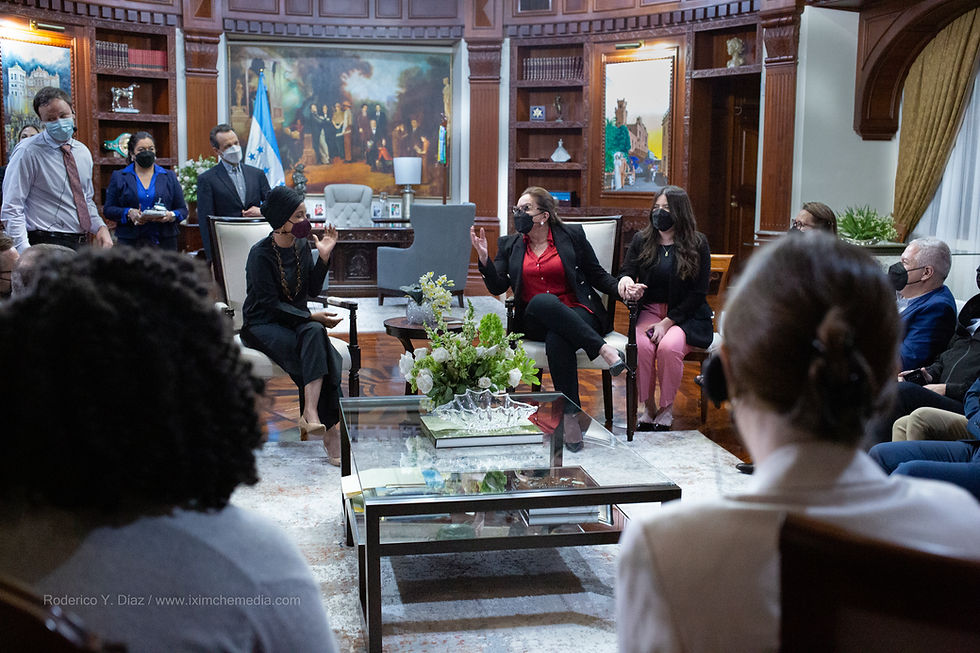Fighting to Protect the Forest in Honduras
- May 19, 2019
- 4 min read
Many in the U.S. are unaware of the connection between refugees fleeing Honduras, and the struggle there for environmental justice.
May 15, 2019

In a remote cluster of homes on a mountain-side pine forest in San Francisco de Locomapa, Honduras, on the ancestral territory of the Tolupán people, I attend a spirit-raising ceremony for Juan Samael Matute and José Salomón Matute. The event takes place forty days after their double murder.
Samael and Salomón were assassinated February 25 in the pine forest they and some other members of the Tolupán tribal community had been defending. Together with the Movimiento Amplio por la Dignidad y la Justicia, they have opposed aggressive logging by private corporations that receive directassistance from the Honduran forest management agency.
Samael and Salomón are the seventh and eighth people murdered from this extremely poor community since 2013, which is deeply divided by the struggle over land rights and by the intervention of corporate money into local politics. Movimiento leaders have been targeted for their efforts to defend the forest. Meanwhile, their killers walk free in the community, and the Honduran Public Prosecutor’s office continues to state that there are “no updates” on the prosecution of the murders.
As caravan after caravan of refugees leave Honduras, many people remain, engaged in active resistance against extractive projects. They are supported here in the United States by activists calling out the role of the United States in perpetrating the Honduran crisis.

The Berta Cáceres Act, originally introduced in 2016 by Congressman Hank Johnson, Democrat of Georgia, notes the role of the Honduran police in corruption and human rights abuses. It calls on the United States to suspend all “security assistance to Honduran military and police until such time as human rights violations by Honduran state security forces cease and their perpetrators are brought to justice.” Cáceres, a Honduran renowned for her work with the Civic Council of Popular and Indigenous Organizations of Honduras (COPINH), was murdered in 2016 by men hired by a company constructing a dam in territory of the Indigenous Lenca people.
Attendees made remarkable efforts to attend the two-day-long ceremony for Samael and Salomón, traveling from hours away by foot or crammed into pickup trucks. There were neighbors, Movimiento Amplio por la Dignidad y la Justicia members from San Pedro Sula, two international observers, and the Lenca Council of Elders, who came from their own ancestral lands in Intibucá, Honduras, to share leadership of the ceremony with a local Christian delegation.
At the center of the gathering was Ramón Matute, a family member of the victims. He reports receiving regular death threats from the same people who murdered his father and brother. Many in the community say that the Honduran police have provided little assistance, even though Ramón is one of thirty-eight members of the community who were granted “protective measures” in 2013 by the Inter-American Commission of Human Rights, due to their high level of risk as human-rights defenders.
Samael and Salomón are buried side by side. A small palm tree adorns the center of the single mound, and flowers decorate the new crosses. Flags and banners declaring the continuity of the fight for human rights and environmental justice are held up, as an elder swings a clay burner of incense.
At the ceremony, Ramón speaks about the martyrdom of his father and brother, and the struggle to defend the forest, the water, and ancestral territory against the government and private companies seeking to exploit them. He and Pascualita Vásquez, the spiritual leader of COPINH who is leading these services, make a commitment to strengthen their relationship and work together to recover and protect their traditions, dignity, and importantly, autonomy.
Violence and repression in Honduras escalated since a 2009 coup, but reached a head following the fraudulent re-election of President Juan Orlando Hernández in November 2018. More than thirty people were killed by state security forces, with little accountability.
The U.S. government officially recognized Juan Orlando as the winner of the contested election, even while the count was still underway, and assist with training and funding Honduran security forces. This violence has had a noticeable chilling effect throughout Honduran society, where, as one person said to me, “We don’t have the chance to leave one funeral before walking into another.”
“I have these little altars of Berta . . . We are looking for a spirituality that protects us. There’s a political understanding of spirituality, of the necessity of protection.”
Asked about how defenders of human and environmental rights manage to persist in the face of the violence, singerand journalist Karla Lara, who was a close friend of Berta Cáceres’s, tells me she sees spirituality as a critical “strategy of struggle, because the dominant culture is the culture of death.”
“I have these little altars of Berta,” she says. “I didn’t do altars before. And it’s not just me, but a lot of people. We are looking for a spirituality that protects us. There’s a political understanding of spirituality, of the necessity of protection.” She describes a daily ritual of passing the smoke of the palo santo through the whole house, and especially of “asking Berta to help us with our political understanding, because this is her greatest absence: her capacity to analyze everything.”
“We have to make a commitment to make this struggle beautiful and to reclaim happiness,” she says.
There is more than enough to be sad about as we release the spirits of Samael and Salomón, whose lives were taken for naked greed. Yet the emphasis is on the flowers, the communities coming together across wide distances, and above all the possibility of life with dignity.
This Article was originally published in The Progressive
Meghan Krausch, PhD, is a public sociologist, activist, and Witness for Peace Midwest board member. Find Meg on Twitter @DrMegKrausch.




Comments